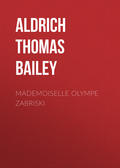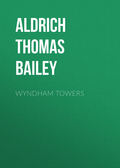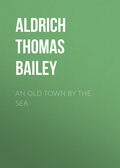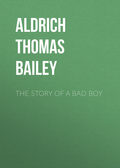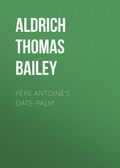
Aldrich Thomas Bailey
The Stillwater Tragedy
XXIV
"Richard did come home last night, after all," said Mr. Slocum, with a flustered air, seating himself at the breakfast table.
Margaret looked up quickly.
"I just met Peters on the street, and he told me," added Mr. Slocum.
"Richard returned last night, and did not come to us!"
"It seems that he watched with Torrini,–the man is going to die."
"Oh," said Margaret, cooling instantly. "That was like Richard; he never thinks of himself first. I would not have had him do differently. Last evening you were filled with I don't know what horrible suspicions, yet see how simply everything explains itself."
"If I could speak candidly, Margaret, if I could express myself without putting you into a passion, I would tell you that Richard's passing the night with that man has given me two or three ugly ideas."
"Positively, papa, you are worse than Mr. Taggett."
"I shall not say another word," replied Mr. Slocum. Then he unfolded the newspaper lying beside him, and constructed a barrier against further colloquy.
An hour afterwards, when Richard threw open the door of his private workshop, Margaret was standing in the middle of the room waiting for him. She turned with a little cry of pleasure, and allowed Richard to take her in his arms, and kept to the spirit and the letter of the promise she had made to herself. If there was an unwonted gravity in Margaret's manner, young Shackford was not keen enough to perceive it. All that morning, wherever he went, he carried with him a sense of Margaret's face resting for a moment against his shoulder, and the happiness of it rendered him wholly oblivious to the constrained and chilly demeanor of her father when they met. The interview was purposely cut short by Mr. Slocum, who avoided Richard the rest of the day with a persistency that must have ended in forcing itself upon his notice, had he not been so engrossed by the work which had accumulated during his absence.
Mr. Slocum had let the correspondence go to the winds, and a formidable collection of unanswered letters lay on Shackford's desk. The forenoon was consumed in reducing the pile and settling the questions that had risen in the shops, for Mr. Slocum had neglected everything. Richard was speedily advised of Blake's dismissal from the yard, but, not knowing what explanation had been offered, was unable to satisfy Stevens' curiosity on the subject. "I must see Slocum about that at once," reflected Richard; but the opportunity did not occur, and he was too much pressed to make a special business of it.
Mr. Slocum, meanwhile, was in a wretched state of suspense and apprehension. Justice Beemis's clerk had served some sort of legal paper–presumably a subpoena–on Richard, who had coolly read it in the yard under the gaze of all, and given no sign of discomposure beyond a momentary lifting of the eyebrows. Then he had carelessly thrust the paper into one of his pockets and continued his directions to the men. Clearly he had as yet no suspicion of the mine that was ready to be sprung under his feet.
Shortly after this little incident, which Mr. Slocum had witnessed from the window of the counting-room, Richard spoke a word or two to Stevens, and quitted the yard. Mr. Slocum dropped into the carving department.
"Where is Mr. Shackford, Stevens?"
"He has gone to Mitchell's Alley, sir. Said he'd be away an hour. Am I to say he was wanted?"
"No," replied Mr. Slocum, hastily; "any time will do. You needn't mention that I inquired for him," and Mr. Slocum returned to the counting-room.
Before the hour expired he again distinguished Richard's voice in the workshops, and the cheery tone of it was a positive affront to Mr. Slocum. Looking back to the week prior to the tragedy in Welch's Court, he recollected Richard's unaccountable dejection; he had had the air of a person meditating some momentous step,–the pallor, the set face, and the introspective eyes. Then came the murder, and Richard's complete prostration. Mr. Slocum in his own excitement had noted it superficially at the time, but now he recalled the young man's inordinate sorrow, and it seemed rather like remorse. Was his present immobile serenity the natural expression of a man whose heart had suddenly ossified, and was no longer capable of throbbing with its guilt? Richard Shackford was rapidly becoming an awful problem to Mr. Slocum.
Since the death of his cousin, Richard had not been so much like his former self. He appeared to have taken up his cheerfulness at the point where he had dropped it three weeks before. If there were any weight resting on his mind, he bore it lightly, with a kind of careless defiance.
In his visit that forenoon to Mitchell's Alley he had arranged for Mrs. Morganson, his cousin's old housekeeper, to watch with Torrini the ensuing night. This left Richard at liberty to spend the evening with Margaret, and finish his correspondence. Directly after tea he repaired to the studio, and, lighting the German student-lamp, fell to work on the letters. Margaret came in shortly with a magazine, and seated herself near the round table at which he was writing. She had dreaded this evening; it could scarcely pass without some mention of Mr. Taggett, and she had resolved not to speak of him. If Richard questioned her it would be very distressing. How could she tell Richard that Mr. Taggett accused him of the murder of his cousin, and that her own father half believed the accusation? No, she could never acknowledge that.
For nearly an hour the silence of the room was interrupted only by the scratching of Richard's pen and the rustling of the magazine as Margaret turned the leaf. Now and then he looked up and caught her eye, and smiled, and went on with his task. It was a veritable return of the old times. Margaret became absorbed in the story she was reading and forgot her uneasiness. Her left hand rested on the pile of answered letters, to which Richard added one at intervals, she mechanically lifting her palm and replacing it on the fresh manuscript. Presently Richard observed this movement and smiled in secret at the slim white hand unconsciously making a paper-weight of itself. He regarded it covertly for a moment, and then his disastrous dream occurred to him. There should be no mistake this time. He drew the small morocco case from his pocket, and leaning across the table slipped the ring on Margaret's finger.
Margaret gave a bewildered start, and then seeing what Richard had done held out her hand to him with a gracious, impetuous little gesture.
"I mean to give it you this morning," he said, pressing his lip to the ring, "but the daylight did not seem fine enough for it."
"I thought you had forgotten," said Margaret, slowly turning the band on her finger.
"The first thing I did in New York was to go to a jeweler's for this ring, and since then I have guarded it day and night as dragonishly as if it had been the Koh-i-Noor diamond, or some inestimable gem which hundreds of envious persons were lying in wait to wrest from me. Walking the streets with this trinket in my possession, I have actually had a sense of personal insecurity. I seemed to invite general assault. That was being very sentimental, was it not?"
"Yes, perhaps."
"That small piece of gold meant so much to me."
"And to me," said Margaret. "Have you finished your letters?"
"Not yet. I shall be through in ten minutes, and then we'll have the evening to ourselves."
Richard hurriedly resumed his writing and Margaret turned to her novel again; but the interest had faded out of it; the figures had grown threadbare and indistinct, like the figures in a piece of old tapestry, and after a moment or two the magazine glided with an unnoticed flutter into the girl's lap. She sat absently twirling the gold loop on her finger.
Richard added the address to the final envelope, dried it with the blotter, and abruptly shut down the lid of the inkstand with an air of as great satisfaction as if he had been the fisherman in the Arabian story corking up the wicked afrite. With his finger still pressing the leaden cover, as though he were afraid the imp of toil would get out again, he was suddenly impressed by the fact that he had seen very little of Mr. Slocum that day.
"I have hardly spoken to him," he reflected. "Where is your father, to-night?"
"He has a headache," said Margaret. "He went to his room immediately after supper."
"It is nothing serious, of course."
"I fancy not; papa is easily excited, and he had had a great deal to trouble him lately,–the strike, and all that."
"I wonder if Mr. Taggett has been bothering him."
"I dare say Mr. Taggett has bothered him."
"You knew of his being in the yard?"
"Not while he was here. Papa told me yesterday. I think Mr. Taggett was scarcely the person to render much assistance."
"Then he has found nothing whatever?"
"Nothing important."
"But anything? Trifles are of importance in a matter like this. Your father never wrote me a word about Taggett."
"Mr. Taggett has made a failure of it, Richard."
"If nothing new has transpired, then I do not understand the summons I received to-day."
"A summons!"
"I've the paper somewhere. No, it is in the pocket of my other coat. I take it there is to be a consultation of some kind at Justice Beemis's office to-morrow."
"I am very glad," said Margaret, with her face brightening. To-morrow would lift the cloud which had spread itself over them all, and was pressing down so heavily on one unconscious head. To-morrow Richard's innocence should shine forth and confound Mr. Taggett. A vague bitterness rose in Margaret's heart as she thought of her father. "Let us talk of something else," she said, brusquely breaking her pause; "let us talk of something pleasant."
"Of ourselves, then," suggested Richard, banishing the shadow which had gathered in his eyes at his first mention of Mr. Taggett's name.
"Of ourselves," repeated Margaret gayly.
"Then you must give me your hand," stipulated Richard, drawing his chair closer to hers.
"There!" said Margaret.
While this was passing, Mr. Slocum, in the solitude of his chamber, was vainly attempting to solve the question whether he had not disregarded all the dictates of duty and common sense in allowing Margaret to spend the evening alone with Richard Shackford. Mr. Slocum saw one thing with painful distinctness–that he could not help himself.
XXV
The next morning Mr. Slocum did not make his appearance in the marble yard. His half-simulated indisposition of the previous night had turned into a genuine headache, of which he perhaps willingly availed himself to remain in his room, for he had no desire to see Richard Shackford that day.
It was an hour before noon. Up to that moment Richard had been engaged in reading and replying to the letters received by the morning's mail, a duty which usually fell to Mr. Slocum. As Richard stepped from the office into the yard a small boy thrust a note into his hand, and then stood off a short distance tranquilly boring with one toe in the loose gravel, and apparently waiting for an answer. Shackford hastily ran his eye over the paper, and turning towards the boy said, a little impatiently:
"Tell him I will come at once."
There was another person in Stillwater that forenoon whose agitation was scarcely less than Mr. Slocum's, though it greatly differed from it in quality. Mr. Slocum was alive to his finger-tips with dismay; Lawyer Perkins was boiling over with indignation. It was a complex indignation, in which astonishment and incredulity were nicely blended with a cordial detestation of Mr. Taggett and vague promptings to inflict some physical injury on Justice Beemis. That he, Melanchthon Perkins, the confidential legal adviser and personal friend of the late Lemuel Shackford, should have been kept for two weeks in profound ignorance of proceedings so nearly touching his lamented client! The explosion of the old lawyer's wrath was so unexpected that Justice Beemis, who had dropped in to make the disclosures and talk the matter over informally, clutched at his broad-brimmed Panama hat and precipitately retreated from the office. Mr. Perkins walked up and down the worn green drugget of his private room for half an hour afterwards, collecting himself, and then dispatched a hurried note to Richard Shackford, requesting an instant interview with him at his, Lawyer Perkins's, chambers.
When, some ten minutes subsequently, Richard entered the low-studded square room, darkened with faded moreen curtains and filled with a stale odor of law-calf, Mr. Perkins was seated at his desk and engaged in transferring certain imposing red-sealed documents to a green baize satchel which he held between his knees. He had regained his equanimity; his features wore their usual expression of judicial severity; nothing denoted his recent discomposure, except perhaps an additional wantonness in the stringy black hair falling over the high forehead,–that pallid high forehead which always wore the look of being covered with cold perspiration.
"Mr. Shackford," said Lawyer Perkins, suspending his operations a second, as he saluted the young man, "I suppose I have done an irregular thing in sending for you, but I did not see any other course open to me. I have been your cousin's attorney for over twenty-five years, and I've a great regard for you personally. That must justify the step I am taking."
"The regard is mutual, I am sure," returned Richard, rather surprised by this friendly overture, for his acquaintance with the lawyer had been of the slightest, though it had extended over many years. "My cousin had very few friends, and I earnestly desire to have them mine. If I were in any trouble, there is no one to whom I would come as unhesitatingly as to you."
"But you are in trouble."
"Yes, my cousin's death was very distressing."
"I do not mean that." Mr. Perkins paused a full moment. "The district attorney has suddenly taken a deep interest in the case, and there is to be a rigorous overhauling of the facts. I am afraid it is going to be very unpleasant for you, Mr. Shackford."
"How could it be otherwise?" asked Richard, tranquilly.
Lawyer Perkins fixed his black eyes on him. "Then you fully understand the situation, and can explain everything?"
"I wish I could. Unfortunately, I can explain nothing. I don't clearly see why I have been summoned to attend as a witness at the investigation to be held to-day in Justice Beemis's office."
"You are unacquainted with any special reason why your testimony is wanted?"
"I cannot conceive why it should be required. I gave my evidence at the time of the inquest, and have nothing to add to it. Strictly speaking, I have had of late years no relations with my cousin. During the last eighteen months we have spoken together but once."
"Have you had any conversation on this subject with Mr. Slocum since your return from New York?"
"No, I have had no opportunity. I was busy all day yesterday; he was ill in the evening, and is still confined to his room."
Mr. Perkins was manifestly embarrassed.
"That is unfortunate," he said, laying the bag on the desk. "I wish you had talked with Mr. Slocum. Of course you were taken into the secret of Taggett's presence in the marble yard?"
"Oh, yes; that was all arranged before I left home."
"You don't know the results of that manoeuvre?"
"There were no results."
"On the contrary, Taggett claims to have made very important discoveries."
"Indeed! Why was I not told!"
"I can't quite comprehend Mr. Slocum's silence."
"What has Taggett discovered?"
"Several things, upon which he builds the gravest suspicions."
"Against whom?"
"Against you."
"Against me!" cried Richard, recoiling. The action was one altogether of natural amazement, and convinced Mr. Perkins, who had keenly watched the effect of his announcement, that young Shackford was being very hardly used.
Justice Beemis had given Mr. Perkins only a brief outline of the facts, and had barely touched on details when the old lawyer's anger had put an end to the conversation. His disgust at having been left out in the cold, though he was in no professional way concerned in the task of discovering the murderer of Lemuel Shackford, had caused Lawyer Perkins instantly to repudiate Mr. Taggett's action. "Taggett is a low, intriguing fellow," he had said to Justice Beemis; "Taggett is a fraud." Young Shackford's ingenuous manner now confirmed Mr. Perkins in that belief.
Richard recovered himself in a second or two. "Why did not Mr. Slocum mention these suspicions to me?" he demanded.
"Perhaps he found it difficult to do so."
"Why should he find it difficult?"
"Suppose he believed them."
"But he could not believe them, whatever they are."
"Well, then, suppose he was not at liberty to speak."
"It seems that you are, Mr. Perkins, and you owe it to me to be explicit. What does Taggett suspect?"
Lawyer Perkins brooded a while before replying. His practice was of a miscellaneous sort, confined in the main to what is technically termed office practice. Though he was frequently engaged in small cases of assault and battery,–he could scarcely escape that in Stillwater,–he had never conducted an important criminal case; but when Lawyer Perkins looked up from his brief reverie, he had fully resolved to undertake the defense of Richard Shackford.
"I will tell you what Taggett suspects," he said slowly, "if you will allow me to tell you in my own way. I must ask a number of questions."
Richard gave a half-impatient nod of assent.
"Where were you on the night of the murder?" inquired Lawyer Perkins, after a slight pause.
"I spent the evening at the Slocums', until ten o'clock; then I went home,–but not directly. It was moonlight, and I walked about, perhaps for an hour."
"Did you meet any one?"
"Not that I recollect. I walked out of town, on the turnpike."
"When you returned to your boarding-house, did you meet any one?"
"No, I let myself in with a pass-key. The family had retired, with the exception of Mr. Pinkham."
"Then you saw him?"
"No, but I heard him; he was playing on the flute at his chamber window, or near it. He always plays on the flute when he can't sleep."
"What o'clock was that?"
"It must have been after eleven."
"Your stroll was confined to the end of the town most remote from Welch's Court?"
"Yes, I just cruised around on the outskirts."
"I wish you had spoken with somebody that night."
"The streets were deserted. I wasn't likely to meet persons on the turnpike."
"However, some one may have seen you without your knowing it?"
"Yes," said Richard curtly. He was growing restive under these interrogations, the drift of which was plain enough to be disagreeable. Moreover, Mr. Perkins had insensibly assumed the tone and air of a counsel cross-examining a witness on the other side. This nocturnal cruise, whose direction and duration were known only to young Shackford, struck Lawyer Perkins unpleasantly. He meditated a moment before putting the next question.
"Were you on good terms–I mean fairly good terms–with your cousin?"
"No," said Richard; "but the fault was not mine. He never liked me. As a child I annoyed him, I suppose, and when I grew up I offended him by running away to sea. My mortal offense, however, was accepting a situation in Slocum's Yard. I have been in my cousin's house only twice in three years."
"When was the last time?"
"A day or two previous to the strike."
"As you were not in the habit of visiting the house, you must have had some purpose in going there. What was the occasion?"
Richard hung his head thoughtfully. "I went there to talk over family matters,–to inform him of my intended marriage to Margaret Slocum. I wanted his good-will and support. Mr. Slocum had offered to take me into the business. I thought perhaps my cousin Lemuel, seeing how prosperous I was, would be more friendly to me."
"Did you wish him to lend you capital?"
"I didn't expect or wish him to; but there was some question of that."
"And he refused?"
"Rather brutally, if I may say so now."
"Was there a quarrel?"
Richard hesitated.
"Of course I don't press you," said Mr. Perkins, with some stiffness. "You are not on the witness stand."
"I began to think I was–in the prisoner's dock," answered Richard, smiling ruefully. "However, I have nothing to conceal. I hesitated to reply to you because it was painful for me to reflect that the last time I saw my cousin we parted in anger. He charge me with attempting to overreach him, and I left the house in indignation."
"That was the last time you saw him?"
"The last time I saw him alive."
"Was there any communication between you two after that?"
"No."
"None whatever?"
"None."
"Are you quite positive?"
"As positive as I can be that I live and have my senses."
Lawyer Perkins pulled a black strand of hair over his forehead, and remained silent for nearly a minute.
"Mr. Shackford, are you sure that your cousin did not write a note to you on the Monday preceding the night of his death?"
"He may have written a dozen, for all I know. I only know that I never received a note or a letter from him in the whole course of my life."
"Then how do you account for the letter which has been found in your rooms in Lime Street,–a letter addressed to you by Lemuel Shackford, and requesting you to call at his house on that fatal Tuesday night?"
"I–I know nothing about it," stammered Richard. "There is no such paper!"
"It was in this office less than one hour ago," said Lawyer Perkins sternly. "It was brought here for me to identify Lemuel Shackford's handwriting. Justice Beemis has that paper!"
"Justice Beemis has it!" exclaimed Richard.
"I have nothing more to say," observed Lawyer Perkins, reaching out his hand towards the green bag, as a sign that the interview was ended. "There were other points I wished to have some light thrown on; but I have gone far enough to see that it is useless."
"What more is there?" demanded Richard in a voice that seemed to come through a fog. "I insist on knowing! You suspect me of my cousin's murder?"
"Mr. Taggett does."
"And you?"
"I am speaking of Mr. Taggett."
"Well, go on, speak of him," said Richard desperately. "What else has he discovered?"
Mr. Perkins wheeled his chair round until he faced the young man.
"He has discovered in your workshop a chisel with a peculiar break in the edge,–a deep notch in the middle of the bevel. With that chisel Lemuel Shackford was killed."
Richard gave a perceptible start, and put his hand to his head, as if a sudden confused memory had set the temples throbbing.
"A full box of safety matches," continued Mr. Perkins, in a cold, measured voice, as though he were demonstrating a mathematical problem, "contains one hundred matches. Mr. Taggett has discovered a box that contains only ninety-nine. The missing match was used that night in Welch's Court."
Richard stared at him blankly. "What can I say?" he gasped.
"Say nothing to me," returned Lawyer Perkins, hastily thrusting a handful of loose papers into the open throat of the green bag, which he garroted an instant afterwards with a thick black cord. Then he rose flurriedly from the chair. "I shall have to leave you," he said; "I've an appointment at the surrogate's."
And Lawyer Perkins passed stiffly from the apartment.
Richard lingered a moment alone in the room with his chin resting on his breast.



